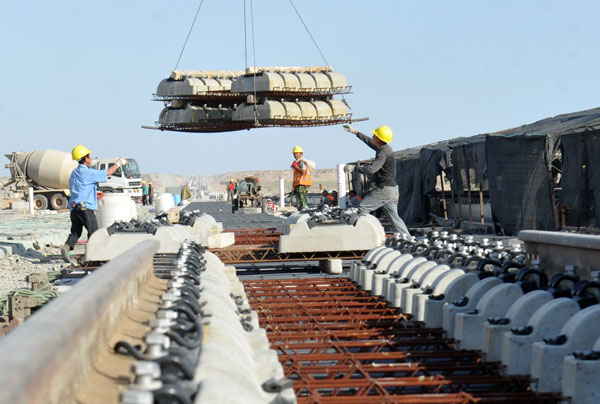Challenging times on 'high-speed Silk Road'
Updated: 2013-07-12 07:38
By Cui Jia (China Daily)
|
||||||||
Ancient artifacts
When the railway passes through Turpan prefecture it faces another challenge; a series of subterranean wells and irrigation channels called keraz, which date back to the Han Dynasties (206 BC-AD 220). There are thought to be around 1,600 keraz in the area around Turpan. They were built to prevent water evaporation in one of China's hottest areas and many are still in use.
 |
|
Workers unload parts for the ballastless track in Hami, part of the Lanzhou-Urumqi high-speed railway route. The project is scheduled for completion in 2014. [Photo / China Daily] |
Although the high-speed railway will only cross 14 keraz on its journey, all were reinforced before construction work began and bridges have been built to carry the engines and rolling stock over the ancient artifacts.
New hubs, purpose-built for high-speed trains, are also under construction. In addition to those in Urumqi and Hami city, stations are also being built in Turpan's Shanshan county and in Turpan city. Unlike the hubs on the old railway, the new stations will be located close to population centers to ensure ease of access. By 2020, Xinjiang will have four rail gateways to inland China, plus four circular lines to connect all the major cities in the region.
New links
Local people are also enthusiastic about plans to build a railway to connect Kashgar in Xinjiang with the Pakistani port of Gwadar.
In June, Pakistani Prime Minister Nawaz Sharif said Pakistan would like to build new road and rail links to Kashgar and establish a Sino-Pakistani economic corridor. In February, China Overseas Port Holding Co took over the management of Gwadar, a deep-water port on the shores of the Arabian Sea and situated close to the Strait of Hormuz and the Iranian border.
If an overland link were to be established, Gwadar Port would become the starting point for deliveries of oil and natural gas to Xinjiang.
"We've already been asked to carry out research into the location of a station at Kashgar for the China-Pakistan railway, but a detailed plan and timetable have yet to be drafted," said Wang Yongzhi, deputy commissioner of Kashgar prefecture, in June.
Wang said China's long experience of construction work on plateaus could prove invaluable if the decision is made to build a railway across the Pamir Plateau.
Yuan Jianmin, director of Xinjiang logistic association, said most freight from Pakistan is transported to China via the sea route, a journey of more than a month, whereas a railway link would allow goods to be transported from Pakistan to cities around China in roughly 10 days.
The poor condition of the roads between Kashgar and Pakistan means the network is ineffective, constraining exports to Pakistan via the land port at Kashgar to just 100,000 metric tons each year, according to Wang. "A railway link between China and Pakistan railway would transform Kashgar and allow it to truly become an economic hub," he said.
Most Viewed
Editor's Picks

|

|

|

|

|

|
Today's Top News
Saudi princess charged with US human trafficking
Asiana takes out apology ad in Chinese media
Asia spending too little on poor: report
Constructive mood at Sino-US talks
China, Russia consider increasing naval drills
No mechanical trouble on Asiana
More Americans favor immigration
Increased cooperation brings benefits
US Weekly

|

|














